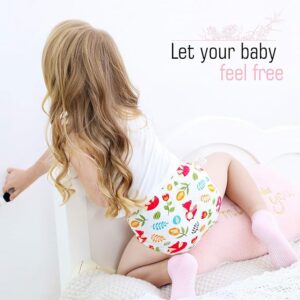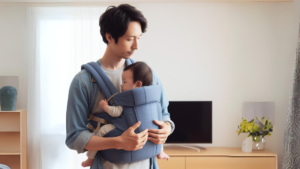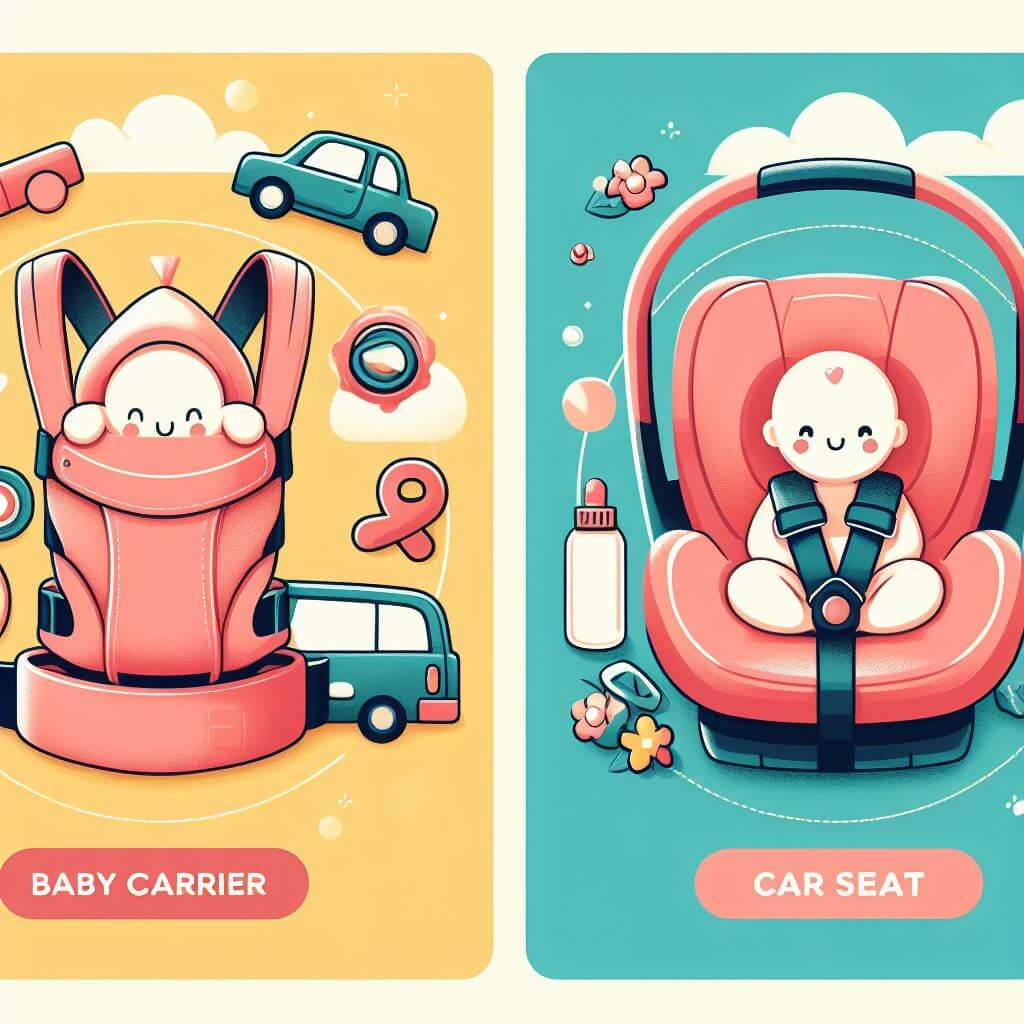
Are you caught in the dilemma of choosing between a baby carrier and a car seat? The decision between these two essential baby gear items can be daunting, but fear not! In this guide, I’ll explore the pros and cons of both options to help you make an informed choice.
Baby Carrier vs Car Seat: Which Is Better?
This is a question that resonates with many parents, and I am here to provide clarity.
Whether you’re looking for convenience, comfort, or safety, I’ll delve into the crucial factors to consider. From user-friendliness to long-term benefits for your little one, I’ll cover it all.
Stay tuned as we navigate through this essential decision-making process together, ensuring you are equipped with the knowledge to make the best choice for both you and your baby.
What is a Baby Carrier?
Baby carriers, slings, and wraps—all of which serve the same purpose—help parents strengthen their bond with their children by carrying their precious infant close to their bodies. Baby wearing has been around and used by many cultures for decades and centuries due to its practicality, plus, bonding experience between parents and their child.
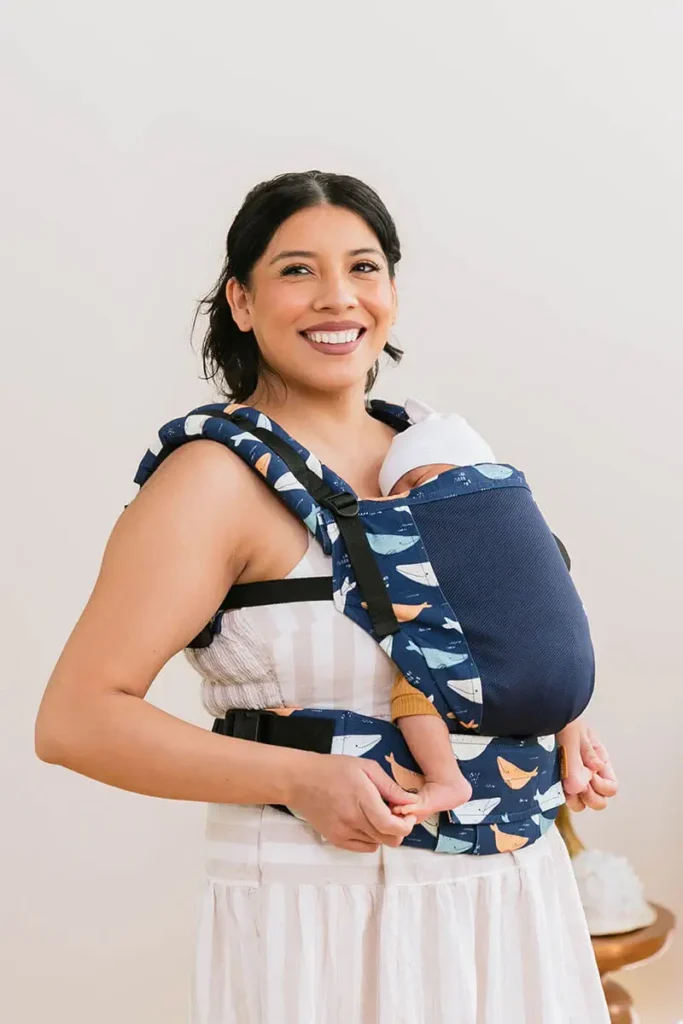
Baby Carrier Advantages
Offers Portability and Closeness to the Baby
One of the remarkable advantages of baby carriers is the portability they offer along with the closeness to your baby. With a baby carrier, you can keep your little one snug against your body, fostering a deep bond and promoting emotional well-being for both you and your baby.
The closeness provided by a carrier not only enhances the parent-child connection but also allows for convenient, hands-free mobility. Whether you’re running errands, taking a stroll, or simply enjoying some quality time together, a baby carrier provides the flexibility and intimacy that both you and your baby crave.
Enhanced Bonding Opportunities
As mentioned earlier, baby carriers promote bonding between parents and their child. Not only does it provide physical closeness, but it also allows for constant interaction with your little one.
This is especially beneficial for working parents who may not have as much time to spend with their children during the day. With a baby carrier, you can bond with your baby while attending to other tasks such as cooking, shopping, or even working on your computer.
Versatile and Easy to Use
Most carriers can be used from birth until toddlerhood (or even beyond), making them a long-term investment for parents. They are also highly versatile in terms of carrying positions, allowing you to switch between front, back, and hip carrying options depending on the age and needs of your child.
Plus, because they are easy to use (especially the soft structured baby carriers and buckle carriers), they are a great options for parents who are always busy and on-the-go.
Easy and quick, just like carrying a backpack!
Ergonomic Support for the Baby’s Development
Only the best baby carriers are designed with your baby’s comfort and safety in mind, modern baby carriers often offer optimal positioning that promotes healthy hip and spine development.
By keeping your baby in the recommended “M” position, with their knees higher than their hips and their spine in a natural curve, baby carriers help distribute your baby’s weight evenly, reducing the strain on their delicate joints.
This ergonomic support not only ensures your baby’s physical well-being but also encourages proper alignment, fostering healthy growth and development as they explore the world from the safety and comfort of your embrace.
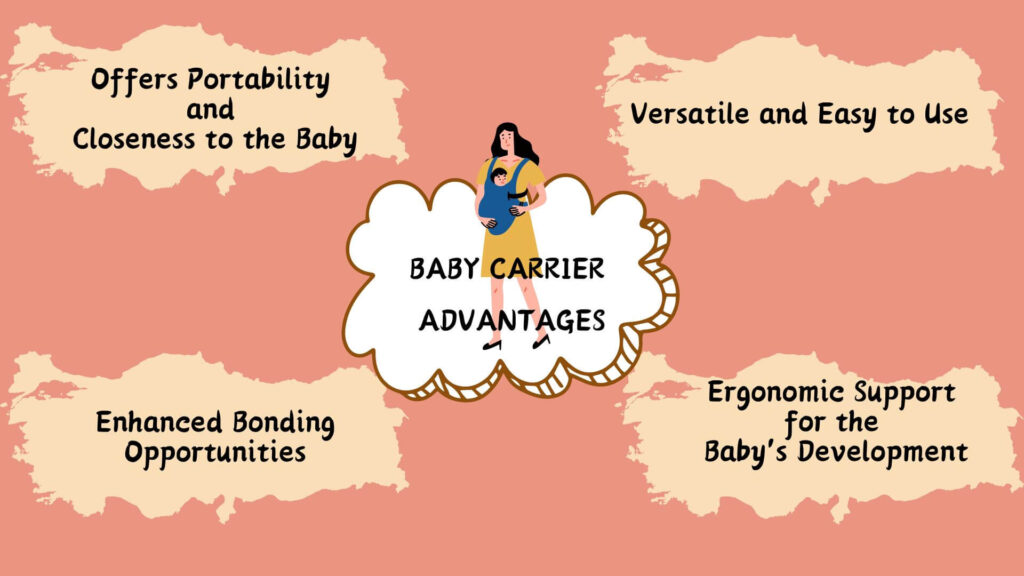
What is a Baby Car Seat?
A baby car seat is a crucial piece of equipment designed to protect your child during vehicle travel. Different from traditional seating, it’s specifically engineered to safeguard infants and young children from injury or death during collisions or sudden stops. Baby car seats are a legal requirement in many countries, underscoring the importance of child safety in vehicles.
Car Seat Advantages
Safety Features
When it comes to ensuring the safety of your precious little one while traveling, baby car seats stand out for their advanced safety features and adherence to strict regulations.
These seats are meticulously designed and tested to meet or exceed safety standards set by regulatory bodies. Additionally, many car seats come with features like side-impact protection and reinforced headrests to offer comprehensive safety coverage.
By choosing a baby car seat that meets safety regulations, you can have peace of mind knowing that your baby is cocooned in a protective shell every time you hit the road, ensuring their well-being on every journey.
Proper Positioning for Car Travel
As mentioned earlier, baby car seats are designed specifically for vehicle travel. With adjustable harnesses and headrests, they provide proper positioning to secure your child in place during a car ride. This is crucial as it helps reduce the risk of injury or ejection during a collision or sudden stop.
Moreover, some convertible car seats offer multiple recline positions, making them suitable for infants and toddlers alike. This allows you to adjust the seat according to your child’s age and size, ensuring maximum safety and comfort throughout their growth stages.
Long-term Usability and Value
Unlike some baby gear items that are quickly outgrown, many car seats are designed to accommodate your child’s growth for several years. Convertible car seats, for instance, can transition from rear-facing for infants to forward-facing for toddlers, and even to booster seats for older children.
This versatility not only saves you from the hassle and expense of purchasing multiple seats as your child grows, but also ensures that your investment in a quality car seat pays off over time.
Compatible with Strollers
Some car seats offer seamless transitions between different modes of transportation, like travel strollers. Many car seat models are designed to be easily attached to compatible stroller frames, creating a convenient travel system for busy parents on the go.
This means you can effortlessly transfer your sleeping baby from the car to the stroller without disturbing their rest, making errands and outings more manageable.
What to Consider When Choosing?
1. Safety considerations
Both baby carriers and car seats prioritize safety, but in different contexts. Look for car seats that meet or exceed safety standards and offer features like side-impact protection and adjustable harness systems. Similarly, choose a baby carrier with ergonomic support and proper positioning to ensure your baby’s safety and comfort.
2. Comfort for both the baby and parent
Consider the comfort of both you and your baby. Baby carriers offer closeness and bonding opportunities, while car seats provide secure positioning during car rides. Think about which option aligns best with your lifestyle and preferences.
3. Practicality in different scenarios
Assess how often you’ll be traveling with your baby in a vehicle versus walking or using public transportation. If you frequently drive, a car seat is indispensable for safety during car rides. Conversely, if you plan to be on foot or need hands-free mobility, a baby carrier might be more practical.
4. Budget and long-term usage
Consider your budget and the lifespan of the product. Some baby carriers may be more costly upfront, but can potentially last for years as your child grows. Car seats that transition into booster seats offer long-term usage and value, while traditional car seats may need to be replaced as your child outgrows them.
5. Compatibility with Other Gear
If you already have a stroller or other baby gear, consider compatibility when choosing between a baby carrier and a car seat. Some car seats are part of travel systems that can be attached to specific stroller models, providing added convenience for seamless transitions between car and stroller.
In Summary
So, baby carrier vs car seat, which is better? The answer is that both have distinct advantages, depending on the specific needs and preferences of parents. While car seats provide unparalleled safety during vehicle travel, baby carriers offer closeness and bonding opportunities in various settings. Ultimately, whichever option you choose, ensuring your child’s safety and comfort should always be the top priority. Choose wisely and enjoy safe and comfortable travels with your bundle of joy by your side. Happy parenting!
FAQs
What are the main differences between a baby carrier and a car seat?
Baby carriers are designed for carrying your baby close to your body while providing hands-free mobility, whereas car seats are specifically engineered to provide safety during vehicle travel. Baby carriers offer intimacy and bonding opportunities, while car seats prioritize protection in the event of a car accident.
How do I decide which option is best for my baby?
Consider your lifestyle, travel habits, and the age and developmental stage of your baby. If you frequently walk or use public transportation and value closeness with your baby, a baby carrier might be more suitable. However, if you primarily travel by car and prioritize safety during car rides, a car seat is essential.
Can I use both a baby carrier and a car seat?
Yes, many parents use both a baby carrier and a car seat, depending on their needs and activities. For example, you might use a car seat for safe travel in a vehicle and switch to a baby carrier for walks or outings where you prefer hands-free mobility and closeness with your baby.

